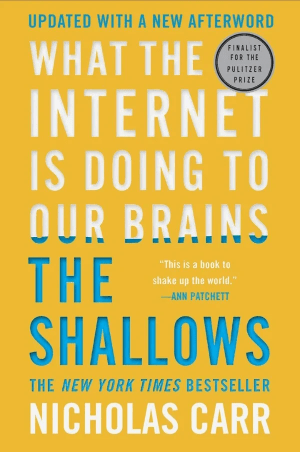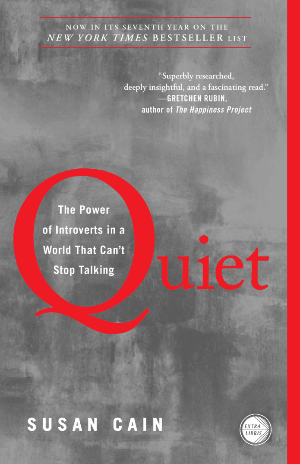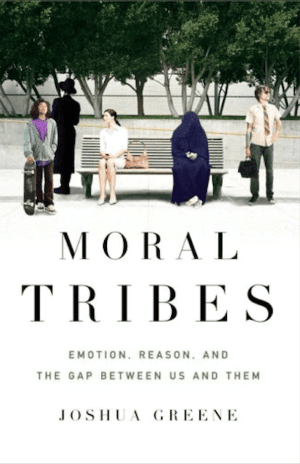
Recommended Reading
The books and articles below are ones I have personally found thought provoking and useful. They will not be technical books on organisational change or project management, they will not describe methodologies for change or projects (they are dime-a-dozen and easy to find). They will delve into individual and team dynamics. They get to the stuff that will help achieve the outcomes desired, will get the change in culture or behaviour needed and will help make that Gantt chart, budget and scope real or merely a vague idea.

The Shallows
The internet's affect on our brains
Nicholas Carr
In a nutshell, this book makes the comparison between deep contemplation and concentration that typically comes from reading linear text vs. the distraction and attention scattering reading via the web. One allows for comprehension and reflection; the other tends to reinforce the need to continuous feeding of the next new bright bit of information without the time and brain processes needed to absorb the last bit.
This is a thoroughly researched and very readable book.
The link here is to a talk by Carr of the topic at the Harvard Book Store.

Quiet
The Power of Introverts in a World That Can't Stop Talking
Susan Cain
This book has been out for a few years now and consistently gets rave reviews. Although written primarily with the introvert in mind, it provides insight into extroverts also. Whilst it does reference a lot of complex research, Cain presents it in a very readable form; an entertaining read.
If you're seeking some guidance on the dynamics of your team, you should consider reading this book

Moral Tribes
Emotion, Reason, and the gap between us and them
Joshua Greene
There is a vast amount of resource available to improve intra-group dynamics and behaviors, e.g how to get a project/programme team working optimally. But if you're interested in a better understanding of the influences on inter-team dynamics then this book might help.
This book, as it title states, is about moral tribes. The author combines neuroscience and philosophy to investigate how morals and values define a tribe (a group) and how to foster cooperation between groups.
This is a thoughtful book that goes well beyond the typical analysis of office behaviors and what would normally be expected to get the project/programme team humming. On the other hand, who hasn't wondered why there seem to be cliques within the team and how to deal with them.
There are lessons here on how projects can be be derailed.

Leadership
Today’s Leaders Need Vulnerability, Not Bravado
Amy C. Edmondson and Tomas Chamorro-Premuzic
Contrary to popular belief, the omnipotent, macho-style effective leaders are not the ones who can best guide their countries or organizations through difficult, uncertain times. Rather the most effective leaders are the ones who are willing to show their vulnerabilities — who can admit to themselves and others when they are wrong and what they know and don’t know. To cultivate that style of leadership, start by telling the truth; ask for help; go outside your comfort zone; when you make a mistake, admit it and apologize; and engage others in your journey of self-improvement.
Link is here
Something to think about
I've added a few thought provoking video's that I think are worth spending a few minutes watching and then, importantly, a bit of time thinking about.
The Difference Between Knowing and Understanding
Moving past what the dictionary tells you, this 5 minute video delves a little into the benefits of really understanding something.
Consider the benefit to a project where your PM understands what that risk will mean to the project vs. merely knowing it exists. Or, where the person responsible for communication understands what the audience needs to understand rather than just publishing milestones or flannel that's too high-level to be meaningful.
The best time to consider this in a project is when the resourcing is being planned. Pay particular attention to the capabilities of the team.
It's a bit light on how one gets to a point of understanding but the message is think about the difference (knowing vs. understanding) and the advantages that understanding brings.
5 Ways to Lead Change In An Era of Constant Change
When a project manager talks about change they usually mean something quite transactional, e.g. new processes, a new application, the training that will be associated with the new application, etc.
This TED video talks about the sort of change I have found makes a difference. Whilst the transactional stuff is obviously important, getting the affected people interested and motivated behind the change will always produce a better outcome than merely focusing o
n tasks.
There are various methodologies that can be used to assist applying change. This video might assist in understanding some foundational principles (Inspire, Go All In, Capability, Culture of Change and Inclusiveness) within which your chosen methodology can be applied.
There is also a reference to some educational institutions "teaching to the test" (leaving the student knowing but maybe not understanding) which links to the video "The Difference Between Knowing and Understanding".
Performance vs Trust
Simon Sinek provides an observation on how Seal teams (in the US Navy) think about their team makeup. The insight is the behaviour they prefer, and the disconnect that often exists with KPIs that drive different behaviours than those desired.






